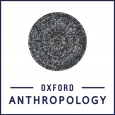School Newsletter 2019 - News and Awards
The School comes top in the QS World Rankings
The School was proud and delighted to learn in February 2019 that it had been ranked in top place by subject in the QS World University Rankings for 2019. The rankings are based on criteria that include employer confidence in graduates, academic reputation and citations by paper. We would like to thank and congratulate all of our students and staff for all of their incredible work and dedication. More information is available on the University website.
We must also congratulate our fellow departments which achieved top ranking, including the Institute of Archaeology, with which we offer the Archaeology and Anthropology undergraduate degree.
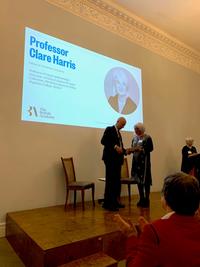
Clare Harris elected to a Fellowship of the British Academy
We are delighted to announce that Professor Clare Harris was elected to the Fellowship of the British Academy in September 2019 in recognition of her outstanding research on visual/material culture of the Himalayas, Tibet and the Tibetan diaspora. In awarding the title of Fellow, the British Academy celebrates the achievements of scholars who have attained distinction in one or more fields in the Humanities and Social Sciences. Professor Harris’s work engages with anthropology, art history and critical museology. In her analyses of art, photography, museums, collections histories, colonial and post-colonial constructions of knowledge, and the politics of representation, she has pioneered new approaches to the study of Tibet, past and present. Professor Harris is also internationally recognised for her collaborations with Tibetan artists, innovative exhibitions, digital projects and award-winning publications.
In late September, Professor Clare Harris attended the admission ceremony for new Fellows at the British Academy in London.
Clare Harris is Professor of Visual Anthropology at the School of Anthropology and Museum Ethnography, Curator for Asian Collections at the Pitt Rivers Museum and a Fellow of Magdalen College.
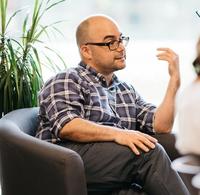
Carlos Vargas-Silva (credit: Maciek Tomiczek, 2019)
Carlos Vargas-Silva becomes Director of COMPAS as Michael Keith steps down after a decade
Professor Michael Keith, who has led COMPAS for over a decade, has stepped down from his position of Director. Michael has transformed COMPAS during his time as Director by developing several graduate programmes in migration, launching major policy and knowledge exchange initiatives and obtaining over £20 million in research funding. We are all immensely grateful to Michael for his hard work during all these years. The good news is that Michael will remain a member of the COMPAS staff, where he will be devoting time to research, DPhil advising, and the successful completion of his large PEAK Urban project, the ESRC Urban Transformations Programme and the Oxford Future Cities Network.
Carlos Vargas-Silva has taken the role of COMPAS Director starting this academic year. He is looking forward to working with everyone across the Department to ensure that COMPAS maintains its global standing as a leading interdisciplinary centre for the study of migration.
Pitt Rivers Museum was shortlisted as one of five finalists for Art Fund Museum of the Year 2019
In April 2019, the news was announced that the Pitt Rivers Museum had been shortlisted as one of five finalists for Art Fund Museum of the Year 2019. The annual award, which celebrates innovation and exceptional achievement in museums and galleries across the UK, is regarded as the most prestigious museum prize in the world. It is a great tribute to all of the Museum's staff who have worked so hard in the past years to make this happen.
The other finalists were HMS Caroline, Belfast; Nottingham Contemporary; St Fagans National Museum of History, Cardiff; and V&A Dundee.
The Museum was shortlisted for the award for its creative programmes of reinvention and reinterpretation, which show a much-loved Victorian space challenging perceptions and demonstrating the vital role it can play in contemporary society. 2018 saw the Museum welcome a record-breaking half a million visitors; deliver a range of powerful exhibitions, such as Kwibuka Rwanda, which told the story of survivors of the 1994 genocide and their attempts to come to terms with loss and trauma; partner with the History of Science Museum and local organisations such as Asylum Welcome and Refugee Resource to provide volunteering opportunities for forced migrants and refugees; and launch an exciting collaboration with Maasai communities to change the narrative used by UK museums to display Maasai artefacts and tell Maasai stories as part of a living culture.
As the Art Fund put it in their press release:
“the Pitt Rivers Museum is remarkable for its singular approach to the presentation of objects and its willingness to encourage new, transformative interpretations. In 2018, the museum embarked on a series of innovative programmes: ‘Hope’ asked radical questions about their collection’s colonial past, ‘Making’ examined the link between making objects and health, ‘No Boundaries’ worked with refugees to reinterpret collections and ‘No Binaries’ encouraged queer responses to the museum’s collections celebrating diversity and challenging prejudices. The museum’s 600,000 strong collection of objects and new creative programmes brought in a record breaking 502,000 visitors last year.”
Congratulations to the St Fagans National Museum of History, Cardiff, which was announced as winner on Wednesday 3 July.
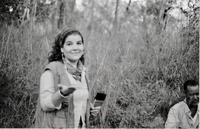
Susana Carvalho is awarded a National Geographic grant
Dr Susana Carvalho, Associate Professor of Palaeoanthropology, was awarded a National Geographic grant in May 2019 for the project 'Searching for our deep African roots south of the equator'. This proposal was submitted to the new National Geographic Society programme 'Uncovering Human Origins in Asia and Africa' and the award will provide crucial support during 2019-20 to further develop the palaeoanthropological research in the Urema Rift, at Gorongosa National Park, Mozambique.
Dace Dzenovska and Steve Rayner were elected to posts in the SAE and RAI respectively
Dr Dace Dzenovska was elected in October 2018 as Program Chair-Elect (2019-2021) for the Society of Anthropology of Europe (SAE). The SAE is a section of the American Anthropological Association that promotes the anthropological study of European societies and cultures and encourages connections between scholars working in Europe.
Also in October 2018, Professor Steve Rayner was elected to the Council of the Royal Anthropological Institute (RAI).
Are human ancestors to blame for the decline of Africa's largest mammals?
Articles by Susana Carvalho and Dr René Bobe on the role of humans in the demise of the large megaherbivore populations of the African continent (species such as elephants, giraffes and large hippos) have attracted attention in the media. Read their comment piece in the journal Science and more at The Conversation.

Dace Dzenovska awarded an ERC grant for research on emptying towns and villages in Eastern Europe
How will climate change shape the Earth’s surface? What are the long-term health effects of food additives? How can online tools change political advocacy and what does this mean for democracy? These are just some of the questions that researchers from around Europe have proposed to explore, and will now be able to, thanks to newly-awarded EU funding.
The European Research Council announced on 10 December 2019 the winners of its latest Consolidator Grant competition: 301 top scientists and scholars across Europe. Funding for these researchers, part of the Horizon 2020 research and innovation programme, is worth in total €600 million. With this support, the new grantees will have a chance to build up their teams and have far-reaching impact. COMPAS is delighted to announce that Associate Professor in Anthropology of Migration, Dace Dzenovska is one of these recipients.
Dace explained why the grant is significant for her: 'I am thrilled to receive the ERC Consolidator Grant for my project on the emptying cities, towns, and villages in Eastern Europe and Russia. For some years now, the global public space has been saturated with images of depopulated Eastern European villages and the ruins of Soviet industrial cities. But there is little understanding of what it means to inhabit—and govern—the settlements that are increasingly abandoned by capital, the state, and people. I see these places as crucial coordinates in the global landscape of capitalism. They are as significant as megacities for understanding how novel forms of economic and political power are remaking the world. This grant will enable me to form a team of scholars that will produce far-reaching analytical insights about global futures on the basis of in-depth ethnographic studies in the former socialist world'.
You can read more about the grant award here.
Laura Rival's visit to Myanmar, January 2019
The main purpose of the visit was to share with young leaders of the Kachin State my long-time expertise in environmental conservation and development issues, as well as ethnobotany and the anthropology of indigenous/ forest peoples in the Amazon basin. To this effect, three Kachin organizations (Pinnya Tagar Academy; Naushawng Development Institute; and KCWG [Kachin Conservation Working Group]) initially invited me by sending an official letter. During my stay in Myitkyina, various other organizations and researchers who have collaborated with Laur Kiik (DPhil candidate at ISCA who is writing his doctoral dissertation under my supervision) also expressed the wish to meet me, and discuss various topics with me. This is how I was invited to teach at the Kachin Theological College, and to visit the agricultural college they have opened in a rural area on the way to Hpakant. Through a number of formal meetings and informal conversations, I was thus able to participate in teaching, research development, and curriculum development at a representative range of Kachin institutions.
I also took advantage of this visit to make contact with the Department of Anthropology and the English Learning Centre at Yangon University, and the Department of Anthropology at Mandalay University. Additionally, I liaised with TIDE (Transformation by Innovation in Distance Education) and IPE (Irrawaddy Policy Exchange) to deliver a training workshop for academics at Mandalay University. I thank warmly all those who have made this unforgettable visit possible.
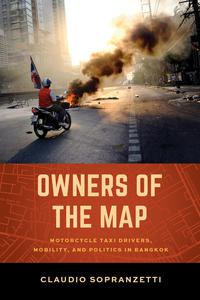
Claudio Sopranzetti wins the 2019 Margaret Mead award
Claudio Sopranzetti, postdoctoral research fellow in social anthropology at All Souls College and soon to take up a lectureship at the Central European University, has been awarded the 2019 Margaret Mead award by the American Anthropological Association and the Society for Applied Anthropology for his monograph Owners of the Map: Motorcycle Taxi Drivers, and Politics in Bangkok.
The award recognizes a younger scholar who, like Margaret Mead, has wide public impact with their anthropology.

